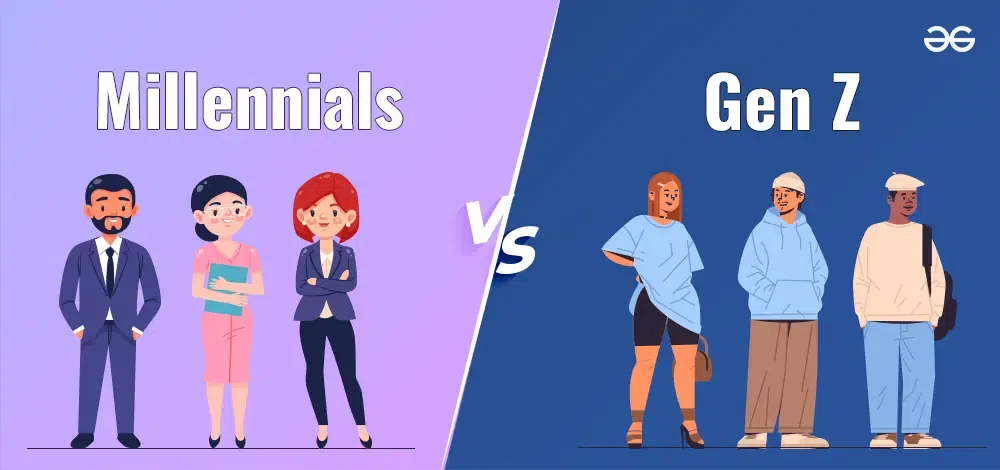
Millennials vs Gen Z
Ever wonder why millennials vs gen z see the world so differently? While they may look similar on the surface, these two generations have grown up in vastly different worlds. From technology to communication styles to life values, millennials vs gen zers have plenty of distinct qualities that make each group unique. But what are those differences, and what can they tell us about the future?
Let’s take a closer look at the contrasting attitudes, preferences, and values that define millennials vs gen z. Along the way, we’ll explore how these differences impact everything from work to social issues, helping us understand where each generation is coming from.
Growing Up in Different Times
A Tale of Two Eras
Millennials, born between the early 1980s and mid-1990s, grew up with the internet’s rise but still remember a time before smartphones and constant connectivity. This generation witnessed the shift from dial-up internet and home computers to high-speed connections and social media. In contrast, Gen Z, born from the late 1990s to early 2010s, grew up immersed in digital technology. They have only known a world with smartphones, high-speed internet, and social media. This digital divide influences the way each generation interacts with technology and views the world around them.
Economic Challenges: Different but Similar
millennials vs gen z came of age during the Great Recession, facing financial instability and limited job prospects right after college. Many millennials vs gen z struggled to find work or moved back in with family while building their careers. Meanwhile, Gen Z faced a different economic challenge with the COVID-19 pandemic, which disrupted their education and introduced new uncertainties. Both generations have had to adapt to turbulent times, but each has developed different approaches to money, careers, and planning for the future.

Technology: Digital Natives vs. Digital Pioneers
Millennials: Pioneers of Social Media
millennials vs gen z were the first generation to dive into social media with platforms like MySpace, Facebook, and later, Instagram. For them, social media was a novelty, and they learned the ropes as it developed. millennials vs gen z tend to use social media to connect with friends, share experiences, and curate their personal brand. They adapted to technology as it evolved, which gives them a unique perspective on the digital world.
Gen Z: The True Digital Natives
Unlike Millennials, Gen Z doesn’t know a world without smartphones and social media. They have mastered apps like TikTok, Snapchat, and Instagram, preferring short, visual content that’s easy to consume on the go. Gen Z tends to embrace authenticity online, shying away from the heavily filtered aesthetics popular with Millennials. For Gen Z, social media is more than just a way to stay connected; it’s a platform for activism, self-expression, and discovery.
Communication Styles: Text vs. Video
Millennials: The Texting Generation
millennials vs gen z were the first to embrace texting as a primary form of communication, with abbreviations like “LOL” and “BRB” becoming part of their everyday language. They’re comfortable with text-based communication like emails, texts, and even long-form social media posts. They value thoroughness and aren’t as inclined to use quick, abbreviated content as their younger counterparts.
Gen Z: Video First
Gen Z prefers video-based content, which aligns with their digital-native status. This generation grew up with YouTube influencers, TikTok challenges, and live-streaming. They’re comfortable in front of the camera and often choose FaceTime or video messaging over texting. This preference for video also reflects in their learning styles, with many Gen Z’ers seeking out video tutorials and visual resources over written instructions.
Work and Career Goals: Stability vs. Flexibility
Millennials: The Search for Stability
millennials vs gen z entered the workforce during a turbulent economic period, which influenced their desire for stability. They tend to value benefits, job security, and work-life balance. Having grown up in a world where getting a degree was supposed to guarantee success, many millennials vs gen z experienced disillusionment in the job market. As a result, they often prioritize stability and career growth, seeking steady income and company loyalty.
Gen Z: Flexibility and Passion
Gen Z has seen the rapid rise of the gig economy, remote work, and entrepreneurship. They prioritize flexibility over stability, looking for jobs that allow for work-life integration, remote options, and meaningful work. Gen Z tends to value personal fulfillment over traditional career paths, which can make them more open to freelance work, side hustles, and project-based roles. For them, a career is not just a way to make money but an opportunity to find purpose and impact.
Social and Political Views: Activism and Awareness
Millennials: Advocates for Change
millennials vs gen z are known for their activism and support for causes like climate change, LGBTQ+ rights, and social justice. They came of age during movements like Occupy Wall Street and the early stages of climate advocacy. millennials vs gen z tend to view activism as an important part of life, though they’re often willing to work within existing systems to bring about change.
Gen Z: Socially Conscious and Unafraid
Gen Z is equally passionate about social causes but has a more radical approach. This generation grew up with access to information and social movements at their fingertips, making them highly aware of global issues from an early age. Gen Z is vocal, unapologetic, and unafraid to challenge the status quo. For many Gen Z’ers, activism isn’t just about changing laws—it’s about redefining norms and creating a new, more inclusive world.
Spending Habits: Experiences vs. Ethics
Millennials: Spending on Experiences
millennials vs gen z value experiences over material possessions. Many choose to spend on travel, dining, and unique activities rather than accumulating traditional assets. This focus on experiences often comes from a desire to live life to the fullest, especially after experiencing economic hardships in their early adulthood.
Gen Z: Conscious Consumers
Gen Z cares deeply about the ethics behind the brands they support. This generation is more likely to research a company’s environmental and social impact before making a purchase. They value sustainability and inclusivity and often prefer brands that align with their values. Gen Z is also more willing to invest in quality products that last, rather than buying cheap or fast-fashion items.
Mental Health: Openness vs. Resilience
Millennials: Normalizing Mental Health Conversations
millennials vs gen z helped pave the way for open discussions around mental health. They grew up in a time when therapy and self-care became more mainstream, leading to a generation that values mental well-being and seeks support when needed. millennials vs gen z tend to focus on work-life balance, stress management, and finding ways to decompress, often advocating for these values in the workplace.
Gen Z: Mental Health as a Priority
Gen Z has taken the mental health conversation a step further, viewing it as a priority rather than just a part of life. This generation is unafraid to set boundaries, demand mental health days, and seek support when needed. For Gen Z, mental health is intertwined with personal growth, and they are willing to make significant changes in their lives to protect it.
What Does the Future Hold?
Collaboration and Learning from Each Other
Despite their differences, millennials vs gen z and Gen Z can learn a lot from each other. Millennials bring resilience, adaptability, and a strong sense of work ethic, while Gen Z offers fresh perspectives, creativity, and a passion for change. In the workplace, these generations can work together to create environments that value stability, flexibility, and innovation.
Shaping Tomorrow’s World Together
The blend of Millennial experience and Gen Z’s fearlessness creates a powerful force for positive change. Together, these generations will shape the future of technology, social justice, and work culture. While they may see things differently, millennials vs gen z share a common goal: to create a better, more inclusive world for future generations.
Final Thoughts
Millennials and Gen Z may not always see eye-to-eye, but their differences reflect the unique times they grew up in. By understanding these generational traits, we can foster greater empathy, collaboration, and mutual respect. After all, each generation has something valuable to offer—whether it’s experience or innovation. So, what can we learn from Millennials and Gen Z today to make tomorrow a better place?







